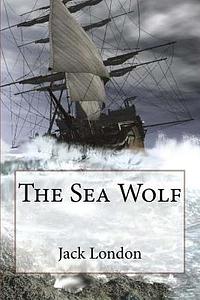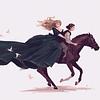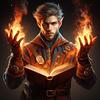Take a photo of a barcode or cover
my ex recommended this book to me in 2016 and he loved the part about diamonds and rubies in chapter 6. what the hell!
adventurous
medium-paced
Plot or Character Driven:
Character
Strong character development:
Complicated
Loveable characters:
No
Diverse cast of characters:
No
Flaws of characters a main focus:
Yes
adventurous
challenging
dark
medium-paced
adventurous
hopeful
inspiring
tense
slow-paced
Plot or Character Driven:
Character
Strong character development:
Yes
Loveable characters:
Yes
Diverse cast of characters:
Yes
Flaws of characters a main focus:
Yes
Primordial era.
Your can easily imagine after my first 2 books that I expected a dog to show up. Just any dog. After realizing that there won't be a dog I just had to bite through. Despite that this story intrigued me. Idk there was just something about it. I was sooo mad when Wolf got paralyzed, I mean why?!?
3.4/10
Your can easily imagine after my first 2 books that I expected a dog to show up. Just any dog. After realizing that there won't be a dog I just had to bite through. Despite that this story intrigued me. Idk there was just something about it. I was sooo mad when Wolf got paralyzed, I mean why?!?
3.4/10
adventurous
dark
tense
medium-paced
Plot or Character Driven:
Character
Strong character development:
Yes
Loveable characters:
No
Diverse cast of characters:
No
Flaws of characters a main focus:
Yes
Extremely pulpy, especially when compared with The Call of the Wild and White Fang, which are so grounded in a realistic (often brutal) world.
The Sea Wolf is grounded on the decks of a sealing schooner and on the character and personality of Wolf Larsen, whom the reader is clearly supposed to find the biggest, baddest man on the planet. The man, the myth, the legend, and all that.
I was not impressed. At its heart evil is…boring. Wolf Larsen’s wickedness is neither original nor clever--he is evil as many people are evil. He is just more articulate about what makes it ok. In some ways both Humphrey (and London through him, I assume) find Wolf Larsen pitiable and even admirable--here is a man who holds to his codes, even if those codes make him a monster. But honestly I fail to see what is so touching about this. He’s just kind of a dick.
After some exciting seafaring adventures (including one involving a storm and missing boats that literally had me on the edge of my seat), Hump and Wolf Larsen meet…(gasp!) a woman! And from here, the reader becomes subjected to multiple rhapsodes on the virtues of the fairer sex that left me nauseous. To her credit, Maud Brewster is not a woman without spark--she is a writer and a thinker, she has opinions and she voices them. But this is not her story, and at the end of the day, she is only there to make Hump feel stronger and more manly. She is not so much a person as she is a kind of chivalric ideal of womanhood: the damsel to Hump’s emerging knighthood.
This makes for an odd juxtaposition of themes. On the one hand, we have the “primitive” and the “savage” represented by Wolf Larsen: the man without morals, the man who defies God, the man who lives by the Law of Club and Fang. Theoretically, he brings out corresponding traits in Hump--returning him to his roots as a man braving the elements, rather than one living in the soft lap of society.
And yet, when Hump and Maud are stranded for weeks (months?) on Endeavour Island, the relationship that emerges between them can only be described as highly sentimental, infused with ideals of chivalry, and completely within the bounds of propriety as defined by civilized society.
So what did Hump really learn? What was Wolf Larsen meant to teach him? Is Wolf Larsen wrong, and moral virtue only breaks down as far as the individual chooses to allow it? Is morality still master, in the end? Or is it good breeding and education that save Maud and Hump from turning into savage animals with (or against) each other?
Why does the civilized world win, and the wild lose?
3 stars.
adventurous
emotional
hopeful
inspiring
medium-paced
adventurous
challenging
slow-paced
adventurous
dark
reflective
medium-paced
Plot or Character Driven:
Character
Strong character development:
Yes
Loveable characters:
No
Diverse cast of characters:
No
Flaws of characters a main focus:
No
Disclaimer: This is one of the books I read/listened to as fast as humanly possible, because it was among the last things standing between me and a degree.
Okay, so, I think London’s character portrait of Wolf Larsen is compelling, and I generally had a good time reading this book. However: I really hate naturalism. The emphasis on physical strength as a virtue (albeit tempered with morality), the biological essentialism, the portrait of the heterosexual couple as the ultimate saving grace of human goodness… bla bla bla. Humphrey Van Weyden, and by extension Jack London, just feels like the kind of guy who’d ask to measure your head. Again, I had a good time! I Just don’t feel like this book gave me anything meaningful to walk away with (and boy did I try). It’s like London read Moby-Dick, missed the entire point, and said “but what if competitive masculinity is good sometimes?”
Okay, so, I think London’s character portrait of Wolf Larsen is compelling, and I generally had a good time reading this book. However: I really hate naturalism. The emphasis on physical strength as a virtue (albeit tempered with morality), the biological essentialism, the portrait of the heterosexual couple as the ultimate saving grace of human goodness… bla bla bla. Humphrey Van Weyden, and by extension Jack London, just feels like the kind of guy who’d ask to measure your head. Again, I had a good time! I Just don’t feel like this book gave me anything meaningful to walk away with (and boy did I try). It’s like London read Moby-Dick, missed the entire point, and said “but what if competitive masculinity is good sometimes?”
Will maybe at some point compose articulate thoughts on this book lol





